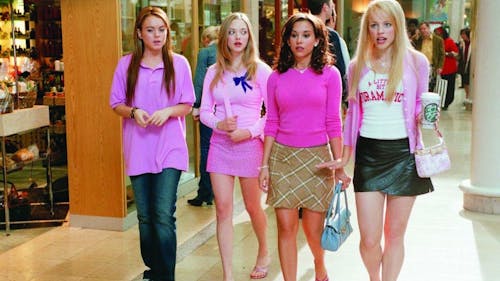14 years after its release, 'Mean Girls' prompts us to wear pink

One of the most memorable scenes in Tina Fey’s 2004 “Mean Girls” hilariously depicts the ways in which so many of us romanticize simple interactions with our crushes. Cady Heron, played by Lindsay Lohan, interprets her high school football star crush Aaron Samuels asking her for the date as his way of flirting. “It’s October third,” Cady replied with dreamy eyes and a toothy smile. The relationship was clearly going places.
The relatable scene has made today's date an informal pop culture holiday, explaining why many of you have been bombarded by tweets and countless posts about the significance of the day. Not only does it mark a milestone in Cady and Aaron’s relationship (in Cady’s eyes), Oct. 3 also falls on a Wednesday this year — the day Karen Smith, played by Amanda Seyfried, infamously informed Cady of the Plastics’ dress code. “On Wednesdays we wear pink,” Karen said, a quote we can add to the long list of iconic references from the film.
Still a movie with major relevance in pop culture — most recently, the film was adapted into a musical on Broadway — it’s hard to believe that "Mean Girls" was released more than 14 years ago. Well over a decade later, “Mean Girls” is still a cult classic for a reason.
Based off the book "Queen Bees and Wannabes" — a self-help book for parents who have watched their teenage children become victims of cliques and bullying — the movie uses a common theme we have seen many times: a look at the cattiness and absurdity of pretty, popular, mean girls in high school. While this theme might seem cliche now, no other movie with the high school hierarchy narrative has been as effective and moving as “Mean Girls.”
Take the way in which Cady uses the animal kingdom as a metaphor to describe her petty female peers. Raised in Africa with little to no experience in the American public school system, she had to rely on the competitiveness between lions to best understand the new environment she was thrown into.
Cady, was more familiar with the nature of animals than with the nature of petty, insecure and mean high-schoolers. To incorporate in the movie the similarity between the nature of high school to the nature of the wild was ingenious and an aspect that makes “Mean Girls” remain a classic today. It was a funny and unique twist and one that perfectly encapsulated the ways in which high-schoolers can easily act like vicious, wild animals.
“Mean GIrls” was a satire about the ugly nature of high school in the suburbs and the cattiness, cruelty and superficiality we sometimes find in human nature. Like many film masterminds, Fey used comedy as a way to tackle a real and heavy topic.
Michelle Siu, a Rutgers Business School sophomore, described how "Mean Girls"'s humorous metaphors made the movie so entertaining for her. “At the time it came out, it was completely relatable and the creators were able to turn something not so fun, like high school, and make it funny, but true,” Siu said. “It’s still popular to this day because, even though high school isn’t as cut-throat as it used to be, it’s still scary and there’s always going to be cliques and a hierarchy, but you just have to figure out where you belong and what makes you happy which I guess is the overall essence of the movie.”
What secured “Mean Girls” a memorable spot in movie history was its ability to be relatable to movie audiences without Hollywood glitz, glamour and movie magic. The dialogue within “Mean Girls” was memorable and witty. It gave outcasts and the LGBTQ community visibility. It tackled issues like body image and slut shaming without being corny. It also consisted of an almost all-female cast, an impressive feat in the very male-dominated movie screens we see in theaters.
The goal of this movie was to give women the power to tell a story that is their own. The acting and performances within “Mean Girls” were relatable and the movie was filled with memorable and legendary quotes and scenes.
Rosalind Wiseman, author of "Queen Bees and Wannabes", spoke about the importance of women in film in a 2014 interview with The Wire. “Both Tina and I seem to be trying to carve out space of how to give women (a) voice in public,” Wiseman said. “So it’s pretty cool to have a collaboration between two people who say, 'Yeah, let’s work together to do this, because you’re smart, you’re funny, I think you’re going to do a good job, let’s try.'"
At its very core, ”Mean Girls” is a movie for anyone who has ever experienced real-life Regina George's, being in or excluded from a clique, and feeling like the world is overrun by selfish and superficial people. Even if you haven’t experienced mean girl bullying, it’s also an eye-opening example of how harmful petty behavior can be. It is a funny and ingenious movie that has remained a classic because, sadly, bullies still exist in all stages of life, from adolescence to adulthood.
“Social groups don’t matter at all; as long as you’re happy with who you surround yourself with then nothing else matters and high school is about figuring all of that out,” Siu said. And it’s true: At the end of the movie, the feuds between the high school cliques are resolved, and everyone is crowned as a prom queen, reminding viewers how shallow and damaging social hierarchies usually end up being.
The burn book, “You go glen coco” and “On Wednesdays we wear pink” are all perfect examples of Fey’s ability to make fun of and heighten a world within high school we all know too well and one we often try to forget.
It has been 14 years, but “Mean Girls” will always remain a classic.



